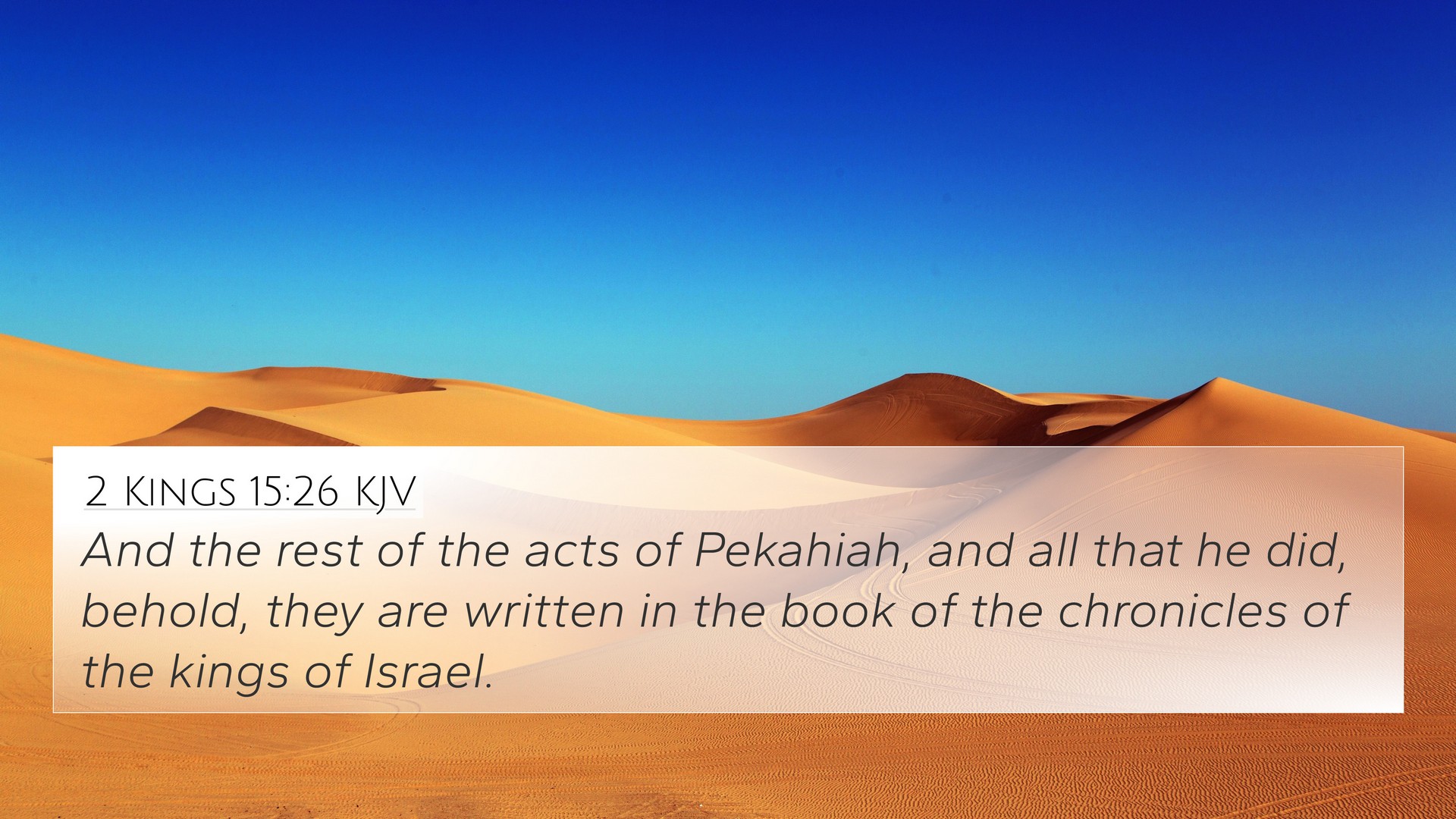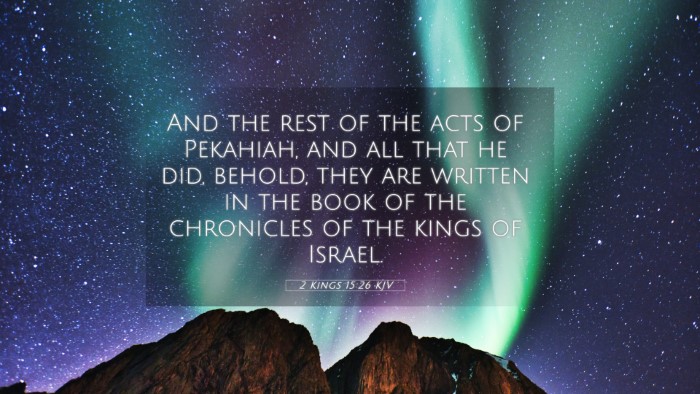Understanding 2 Kings 15:26
2 Kings 15:26 states: "And the rest of the acts of Pekahiah, and all that he did, are they not written in the book of the chronicles of the kings of Israel?"
This brief statement serves as both a summary of Gedaliah's reign and a prompt to explore the broader historical context of the kingdom of Israel during this tumultuous period.
Context and Overview
Throughout the book of 2 Kings, we see a cycle of reformation and deterioration in Israel's leadership. Pekahiah, the son of Menahem, reigns during a critical time marked by ongoing conflict with neighboring nations and internal strife within Israel.
Commentary Insights
The following insights from notable public domain commentaries help us delve deeper into the meaning and significance of this verse:
-
Matthew Henry:
Henry emphasizes the brevity of Pekahiah’s reign, underscoring the instability of Israel's monarchy at this time. This lack of detail in Pekahiah's acts suggests that his reign was perhaps less significant in terms of the spiritual and political health of Israel.
-
Albert Barnes:
Barnes points out how the reference to a "book of the chronicles" indicates a historical record that contains more details about the kings of Israel. This reflects the importance of maintaining a historical narrative for future generations and provides insights into God’s dealings with Israel.
-
Adam Clarke:
Clarke highlights the theme of divine judgment woven throughout the reigns of Israel's kings. The lack of any specific accounts of Pekahiah's reign suggests a form of divine disapproval or neglect, which is a recurring theme in the history of Israel’s leadership.
Thematic Connections
The verse contributes to several broader themes evident throughout the Scriptures:
-
Continuation of the Monarchy:
The significance of succession in the line of kings illustrates the ongoing narrative of Israel's leadership and God’s covenant with them.
-
Historical Remembrance:
The reference to chronicles draws attention to the importance of recording history as a means of remembrance, emphasizing lessons learned from past leaders.
-
Divine Sovereignty:
The mention of God’s overarching sovereignty is critical, as each king’s reign serves as a testament to God’s ultimate control over nations.
Cross-References to 2 Kings 15:26
To understand this verse more fully, it is beneficial to explore cross-references that relate to its themes and characters:
- 2 Kings 15:25: Discusses the actions of Pekah, Pekahiah’s conspirator.
- 1 Chronicles 5:26: Mentions the Assyrian invasion during the times of Israel's kings, providing context for political turmoil.
- 2 Kings 14:29: Refers to the reign of Jeroboam II, offering a comparison to later kings.
- 2 Chronicles 26:1: Chronicles the kings of Judah, highlighting the parallel narratives of both kingdoms.
- Hosea 1:1: A prophetic context during Pekahiah's reign, emphasizing God’s messages to Israel.
- Micah 1:1: Another prophetic book that places emphasis on the political conditions affecting Israel during this period.
- Isaiah 7:1-2: Discusses the effects of foreign alliances and threats faced by Israel, further highlighting the instability.
Applications and Reflection
The study of 2 Kings 15:26 encourages believers to:
-
Recognize God's Sovereignty:
Appreciate the overarching narrative of God's control over history and leadership.
-
Learn from History:
Apply the lessons learned from Israel’s past rulers to contemporary leadership and governance.
-
Engage with Scripture:
Use tools for Bible cross-referencing to gain deeper understanding and context when studying verses.
Conclusion
Understanding 2 Kings 15:26 involves recognizing the context of Israel's monarchy, the significance of historical records in understandings God’s sovereignty, and applying these lessons in contemporary settings. By exploring the connections between this and other Scriptures, believers can gather insights for spiritual growth and leadership principles.


